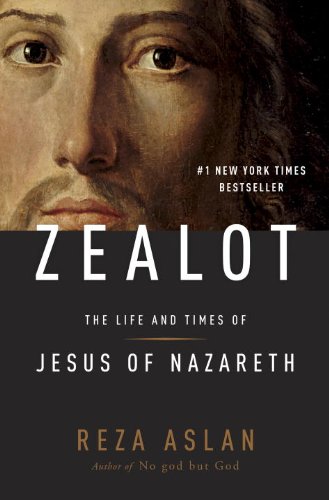Book review: Zealot: The Life and Times of Jesus of Nazareth
by Reza Aslan
★★★★★
Captivating! Reza is a good story teller who holds your attention on every topic. His perception of Jesus differs considerably from mine, but that’s part of what made the reading interesting for me.
Aslan portrays Jesus as a revolutionary predicting a violent overthrow of the current government, both Roman and Judean. Woe to the corrupt ruling class, because the Kingdom of God is coming, with chilling destruction! Aslan points out that in the political turmoil of the first century, calling oneself the Messiah was tantamount to declaring war on Rome, and thus he assumes Jesus followed the mold of every other Jewish messianic figure of the time. The apparent failure of this portrayal is that the Gospels take pains to highlight the daftness of the apostles and their dream for a military overthrow, repeatedly redefining the Kingdom of God instead as a peaceful grassroots infiltration. Aslan recognizes this, and insists that the tone of the Gospels reflect post-war attitudes of complacency and cooperation with Rome, after the nation’s zeal had been stamped out by defeat. “Thus began the long process of transforming Jesus from a revolutionary Jewish nationalist into a peaceful spiritual leader with no interest in any earthly matter.”
Indeed, this process is even longer than I imagined, for in Aslan’s opinion, it begins even before the Gospels. It begins back at the time of Stephen’s stoning. “What Stephen cries out in the midst of his death throes is nothing less than the launch of a wholly new religion … buried with [Stephen] under the rubble of stones is the last trace of the historical person known as Jesus of Nazareth.” Aslan believes Paul also taught that Jesus was God on earth, so the high Christology of today’s Christianity began quite early after Jesus’ death.
But let’s get back to Jesus the Revolutionary. Says Aslan, “Of all the stories told about the life of Jesus of Nazareth, there is one … that, more than any other word or deed, helps reveal who Jesus was and what Jesus meant.” So differently do Aslan and I view Jesus that I actually imagined he was thinking about Jesus feeding the multitude. He wasn’t, of course. He was talking about when Jesus violently attacks the Temple. Fascinating how different Jesus can look, depending upon which side of him you hold up to the light. Aslan’s book is one-sided, a very well-written page-turner about Jesus, the Zealot.
This is not to say that Jesus himself openly advocated violent actions. But he was certainly no pacifist. “Do not think that I have come to bring peace on earth. I have not come to bring peace, but the sword.”
When Jesus holds up a penny and says, “Render to Caesar the things that are Caesars, and to God the things that are God’s,” he is not encouraging an aesthetic life unhindered by the cares of the world. Says Aslan, Jesus’ answer is “as clear a statement as one can find in the gospels on where exactly he fell in the debate between the priests and the zealots.” Jesus says, give the coin with its abominable picture of Caesar back to Rome, and take back the land which God has given to us. This is not instruction to get along; this is instruction to draw a dividing line between heathen and God-follower; a line between Judea and Rome.
I believe Aslan contains a few errors in his research, but they are minor and do not distract from the conclusion. Of greater importance is recognizing where Aslan’s own strong opinions come into play. Yet this is a book I can wholeheartedly recommend, as both thought-provoking and entertaining.












 354 Circles
354 Circles
 603 Goodreads Friends & Fans
603 Goodreads Friends & Fans

 Hello! I'm an author, historical Jesus scholar, book reviewer, and liberal Christian, which means I appreciate and attempt to exercise the humanitarian teachings of Jesus without getting hung up on any particular supernatural or religious beliefs.
The Bible is a magnificent book that has inspired and spiritually fed generations for thousands of years, and each new century seems to bring a deeper understanding of life’s purpose. This is true of not only Christianity; through the years, our age-old religions are slowly transforming from superstitious rituals into humanitarian philosophies. In short, we are growing up, and I am thrilled to be riding the wave.
I avidly read all thought-provoking religion titles. New authors: I'd love to read and review your book!
Hello! I'm an author, historical Jesus scholar, book reviewer, and liberal Christian, which means I appreciate and attempt to exercise the humanitarian teachings of Jesus without getting hung up on any particular supernatural or religious beliefs.
The Bible is a magnificent book that has inspired and spiritually fed generations for thousands of years, and each new century seems to bring a deeper understanding of life’s purpose. This is true of not only Christianity; through the years, our age-old religions are slowly transforming from superstitious rituals into humanitarian philosophies. In short, we are growing up, and I am thrilled to be riding the wave.
I avidly read all thought-provoking religion titles. New authors: I'd love to read and review your book!
 Hi! While Lee writes the articles and reviews the books, I edit, organize, and maintain the blog. The views expressed here are Lee's but I'm his biggest supporter! :-)
Hi! While Lee writes the articles and reviews the books, I edit, organize, and maintain the blog. The views expressed here are Lee's but I'm his biggest supporter! :-)
Connect With Me!